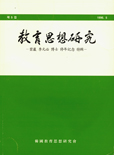- 영문명
- A Study on Educational Thought of Robert Ulich
- 발행기관
- 한국교육사상학회
- 저자명
- 최관경(Choi, Kwan-kyung)
- 간행물 정보
- 『교육사상연구』교육사상연구 제5집, 201~226쪽, 전체 26쪽
- 주제분류
- 사회과학 > 교육학
- 파일형태
- 발행일자
- 1996.05.30
5,920원
구매일시로부터 72시간 이내에 다운로드 가능합니다.
이 학술논문 정보는 (주)교보문고와 각 발행기관 사이에 저작물 이용 계약이 체결된 것으로, 교보문고를 통해 제공되고 있습니다.

국문 초록
영문 초록
The purpose of this study is to examine the Educational Vies of Robert Ulich in relation to his conception of the nature of man.
First of all, the remarkable facts of Robert Ulich's career are as follows.
He was born on April 21, 1890, in Bavatia, Germany, and died in 1977, in Stuttgart, Germany.
Education
1900-09 Humanistisches Gymnasium, Bavaria
1909-15 Universities of Freiburg, Neufchatel, Munich, Berlin, Leipzing
Ph D (University of Leipzig) 1915
Litt D (Clark University) 1957
Experience
1915-16 Research Fellow, University of Leipzig
1917-21 Libarian, University of Leipzig
1921-23 Assistant Counselor in the Saxon University of Technology
1929-30 Exchange Lecturer, Teacher College, Columbia University
1934-36 Lecturer on Education, Harvard University
1937-70 Professor of Education, Harvard University
1954-70 James Bryant Conant Professor of Education, Harvard University
Such a record tells little by itself Especially, his departure from Germany in 1933 was not caused by academic ambition. It was rather a magnificant protest against a way of life he could not approve. It was an art of personal courage and intellectual honesty.
One of the profound questions with which Ulich wrestled and to which he contributed sound insight was the problem of the nature of man. He regards man as the self-transcendent being. The philosophy of transcendence as represented by Robert Ulich is the frame-work which gives pattern and perspective to the entire range of his writing in the field of education.
He interprets the question "why do we educate?" as asking not so much for the final purpose of education as for its causes. The answer will be found in the fact that education has something to do, first, with our physical organism second, with our communal life the third, with the ethical motives inherent in culture. We ask, consequently, for the reasons for education from the biological, the socilogical, and the ethical points of view. If we take education in the widest sense of the word, all life is education and nothing is exempt from it. It is the constant interactions among people and between people and the objective world. It is, to a large extent, identical with culture, and its history with the history of the advances and regressions of human-kind. For Ulich education is the art of transforming the individual into one who understands and appreciates the cultural and spiritual values of his community and who utilizes his inheritance as a responsible participant in the destiny of the community.
But Ulich contends that modern education suffers from a frightening loss of inner substance and this loss may become the greater, the more education turns away from the humanities in order to become a social science in the superficial sense. He also believes that piety congeals into prejudice, justice into self-righteousness, and love into sentimentalism, unless education produces an attitude of cosmic reverence.
After all, the core points of Robert Ulich' educational thought can be described as follow.
Firstly, man is responsible not only to himself and his society he must also try to identify with the cosmic forces.
Secondly, a system of education in which immediate personal reward is the main criterion of success helps in running the nation for whose future it is responsible. Only that education wich teaches youth that the path toward one's true self is the ever-widening sense of communion makes a nation great.
Thirdly, true thinking that refuses to be satisfied with the superficial solution of the problem at hand, in order words, has perspective to distinguish that which is important and that which is unimportant, saves man from being overwhelmed by the threat of his own little self, the latter being the greatest of all human menaces.
Fourthly, an education which believes it thrives better without deeper metaphysical interest may produce a materially informed and busy society, but it will be one without depth, soo
목차
Ⅰ 서론
Ⅱ 본론
Ⅲ 결론
참고문헌
Summary
키워드
해당간행물 수록 논문
참고문헌
관련논문
사회과학 > 교육학분야 BEST
더보기사회과학 > 교육학분야 NEW
- 교사의 상호작용적 그림책 읽기 전략이 만 2세 영아의 언어발달 및 정서지능에 미치는 영향
- 그림책 속 부엌: 사회․환경․생태적 문제의 재현과 의미
- 그림책 속 장애아동의 기호 읽기 -Deleuze의 기호학을 중심으로-
최근 이용한 논문
교보eBook 첫 방문을 환영 합니다!

신규가입 혜택 지급이 완료 되었습니다.
바로 사용 가능한 교보e캐시 1,000원 (유효기간 7일)
지금 바로 교보eBook의 다양한 콘텐츠를 이용해 보세요!



